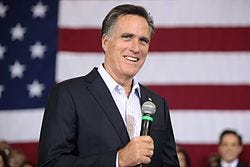Mitt Romney: A Radical Role Model
Grace in an era of anger
As Mitt Romney recently said farewell to the Senate, he spoke with an understated and generous eloquence. He credited others for his success, described Americans as “fundamentally good” and warned of those who would replace “love with hate.” It was, in other words, a radical speech. At least for this era.
Romney a radical? I say that in his quiet way, he has always been quite radical – and a role model for public service -- as he has defied the tide of partisanship and attention-seeking. He is among those I have admired most; a man who gave politics a good name.
The soon-to-retire senator from Utah became a national figure when he served as president and chief executive officer of the 2002 Olympics in Salt Lake City. He took over an organization that was in financial crisis and, in a remarkable feat of management, produced games that actually ended with a surplus. He then went home to Massachusetts and was elected governor.
As governor Romney accomplished what no one else could, namely the creation of a health care system that covered every citizen. Romneycare required that everyone obtain insurance, with the state covering this cost for low-income individuals and families. These elements made the Massachusetts plan a model for the federal Obamacare program. Of course, neither delivered on all that was promised, but both brought peace of mind to vast numbers of people who formerly lived in fear of getting sick or injured and then hit with enormous medical bills.
Romney’s healthcare reform marked him as a leader who could work in a bipartisan way to solve a huge problem. He did it again when he got the state legislature to help him eliminate a looming $1.2 billion budget deficit. These two achievements showed he was both a true fiscal conservative and a compassionate one.
Not without ambition, Romney ran for the GOP’s presidential nomination, losing in 2008 but winning in 2012. In Democrat Barack Obama, he faced an incumbent who was still quite popular and also willing to play hardball in a way that Romney would not. Obama caricatured him as an out-of-touch rich guy. Romney, meanwhile, correctly argued that Russia posed the greatest foreign policy challenge. In the end, he couldn’t overcome Obama’s charisma and lost by four points.
As a senator, Romney was notably successful in leading certain Republicans to help pass gun safety laws, the Covid relief act, and the infrastructure bill that began to address the enormous need to fix our roads, ports, airports, rail system, and more. This was something that Republicans and Democrats had promised to do for decades.
* * *
Many senators would credit only themselves with their successes, but Romney refused to do so. Instead, he praised his colleagues and his staff, noting, “I have consistently been surrounded by others, usually smarter, often more experienced, always becoming friends.“ In this statement, he connected himself with values of humility and community. This emphasis shows he remembers a time when, by tradition, accomplished people didn’t need to grab all the credit and understood that no one stands alone.
In his appreciation of relationships with others – who “always became friends” -- Romney offers his life as a contrast to a society where isolation and loneliness have become significant problems. The number of Americans who tell pollsters they don’t have any friends has risen 400 percent in the last three decades. More than 50 percent say no one knows them very well. Meanwhile, so-called deaths of despair – deaths by suicide or substance abuse – are at record levels and it feels like there’s more hostility in how we deal with each other.
The meanness we see and feel has been encouraged by Donald Trump who, as a candidate and president, has spent the last ten years publicly demeaning those who disagree with him. I am sure that he is one person Romney had in mind when he spoke of those who “would tear at our unity or replace love with hate.”
Others may speak of love and unity, but in Romney’s case, it is absolutely sincere. So too is the example he set for unselfishness and grace. He has been, in many ways, the anti-Trump. In his life after the Senate, he plans to “be a voice for unity and virtue.” Here’s hoping he will be heard.



Disappointed he wouldn’t endorse Kamala.
Adam, you seem to be cut from the same cloth as Romney. Many of his desirable qualities in a politician could be describing you. He certainly was one to get things done as your examples point out. We need more like him (and you) leading this country.